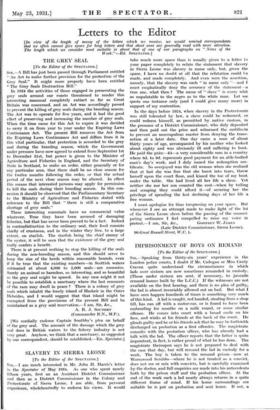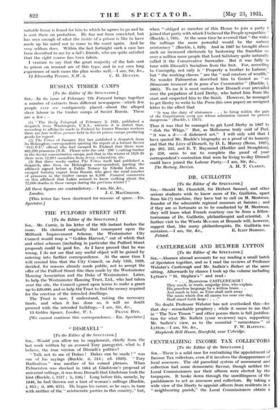IMPRISONMENT OF BOYS ON REMAND
[To the Editor of the SrEcrxron.]
Sta,—Speaking from thirty-six years' experience in the London police courts, I doubt if Mr. Cadogan or Miss Cicely Craven quite understand the circumstances in which lads over sixteen are now sometimes remanded in custody. (Those under sixteen are sent, if necessary, to juvenile remand homes built by the L.C.C.) If the witnesses are not available on the first hearing, and there is no plea of guilty, the lad is almost invariably allowed out on bail. But what I have seen happen hundreds of times is something very much of this kind. A lad is caught, red handed, stealing from a shop till, has run off with a motor-car, or is found to have been embezzling for months on a milk round, or some similar offence. He comes into court with a broad smile on his face, and winks at his friends at the back of the court. He pleads guilty and he or his friends ask that he may be forthwith discharged on probation as a first offender. The magistrate consults with the probation officer, who has already had a talk with the lad. The officer reports that the latter is quite impenitent, in fact, is rather proud of what he has done. The magistrate thereupon says he is not prepared to deal with the case that day, but will remand the lad in custody for a week. The boy is taken to' the remand prison—now at Wormwood Scrubbs—where he is not treated as a convict, does not see or mix with convicts, but is carefully examined by the doctor, and full enquiries are made into his antecedents both by the prison staff and the probation officer. At the end of the week such a lad nearly always returns in a quite different frame of mind. If his home surroundings are suitable he is put on probation and sent home. If not, a
suitable home is found for him to which he agrees to go and he is sent there on probation. He has not been convicted, but has seen enough of what the inside of a prison is like to have made up his mind not to come to the court again. And he very seldom does. Within the last fortnight such a case has been described to me by a lad's friends, who are quite satisfied that the right course has been taken.
I venture to say that the great majority of the lads sent to prison on remand are of this type, and in my own long experience of such cases the plan works well.—I am, Sir, &c.,







































 Previous page
Previous page